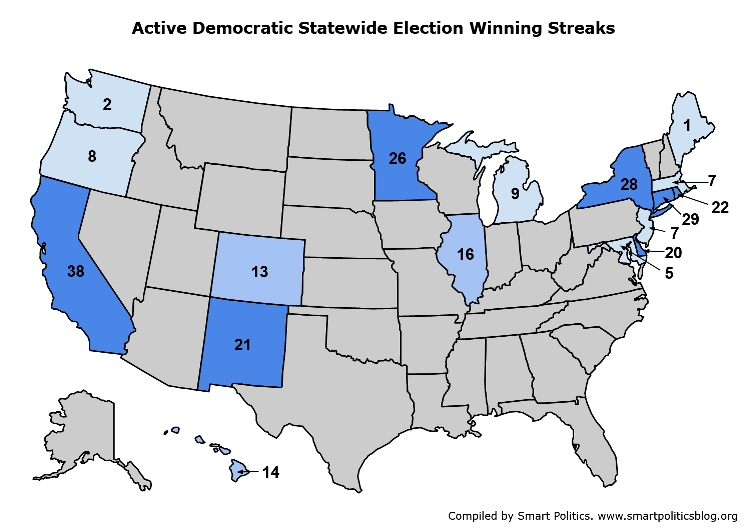The Largest Democratic Statewide Election Winning Streaks
Which streaks are most likely to come to a halt in November?

This is not an unreasonable supposition as red states are generally getting redder and blue states are getting bluer.
Over the next two reports, Smart Politics will highlight those states with the largest (and longest) partisan winning streaks across all offices with statewide elections.
Today’s report focuses on the 17 states with active Democratic winning streaks – some lengthy, some quite modest.
Perhaps to little surprise, California leads the way where Democrats have rattled off 38 consecutive wins since 2008 across nine offices (President, U.S. Senate, Governor, Lieutenant Governor, Secretary of State, Controller, Treasurer, Attorney General, and Insurance Commissioner).
Republicans were last victorious in the Golden State in 2006 when Arnold Schwarzenegger won a second term as Governor and Steve Poizner flipped the open seat race for Insurance Commissioner.
But during the subsequent 38 statewide races since 2008, Republicans came within single digits of victory just three times:
- 2010 Attorney General: San Francisco D.A. Kamala Harris defeated Los Angeles D.A. Steve Cooley by 0.8 points
- 2014 Secretary of State: State Senator Alex Padilla beat public policy think tank executive director Pete Peterson by 7.3 points
- 2014 Controller: State Board of Equalization member Betty Yee defeated Fresno Mayor Ashley Swearengin by 7.9 points
[In 2018, Poizner ran again for Insurance Commissioner – this time as an independent – and lost by 5.7 points to State Senator Ricardo Lara].
Democrats in six other states have racked up at least 20 consecutive victories:
- Connecticut – 29 in a row since 2008 (the party’s most recent losses came in 2006 to Republican Governor Jodi Rell and U.S. Senator Joe Lieberman running as an independent)
- New York – 28 in a row since 2004 (Republican Governor George Pataki, 2002)
- Minnesota – 26 in a row since 2008 (Republican Governor Tim Pawlenty, 2006)
- Rhode Island – 22 in a row since 2012 (Lincoln Chafee winning the governorship as an independent, 2010)
- New Mexico – 21 in a row since 2018 (Republican Supreme Court Justice Judith Nakamura, 2016)
- Delaware – 20 in a row since 2016 (Republican Kenneth Simpler winning the open seat for State Treasurer, 2014)
Democratic winning streaks have reached double-digits in three other states (16 in Illinois, 14 in Hawaii, 13 in Colorado) with seven states coming in under ten contests (nine in Michigan, eight in Oregon, seven in New Jersey and Massachusetts, five in Maryland, two in Washington, and one in Maine).
So in which of these 17 states are Democrats most likely to see their streaks end in 2024?
Two of these states will only host partisan statewide races for president in November: Illinois and Colorado. Presumptive GOP nominee Donald Trump is not expected to win either of those states where Republican presidential nominees were last victorious in 1988 and 2004 respectively.
Twelve states will conduct contests for president and U.S. Senator: California, Connecticut, Hawaii, Maine, Maryland, Massachusetts, Michigan, Minnesota, New Jersey, New Mexico, New York, and Rhode Island.
Of those 12 states, presumptive Democratic nominee Joe Biden is projected to win 11 with only Michigan falling into the ‘toss-up’ category.
Down the ballot in U.S. Senate races, Democrats will almost certainly lose Maine to independent (and Democratic Party-caucusing) U.S. Senator Angus King.
In Maryland, former Republican Governor Larry Hogan left office in January 2023 with high approval ratings and his expected nomination may give Democrats headaches. The question is whether or not Hogan banked enough good will during his eight years in office to swim against the tide of his party’s standard bearer at the top of the ticket to eke out a win.
In Michigan, the expected Democratic nominee, U.S. Representative Elissa Slotkin, could have a slight advantage in the open seat race – particularly as she stockpiles money while several high profile Republicans duke it out in record numbers for the early August primary. Democrats are looking to win their 10th consecutive election for the office.
That leaves three states on this list hosting more than two statewide contests: Delaware, Oregon, and Washington.
Biden is expected to sweep all three with Democrats defending safe U.S. Senate seats in Delaware and Washington.
Delaware also will hold statewide elections for its at-large U.S. House seat, Governor, Lieutenant Governor, and Insurance Commissioner. Democrats have won the last eight elections for Lieutenant Governor by double-digits plus each of the last seven by double-digits for the U.S. House, and the last four by that margin for both Governor and Insurance Commissioner.
Oregon will also hold statewide elections for the offices of Secretary of State, Attorney General, and Treasurer – all open seat races.
Democrats have won the last nine races for Oregon Treasurer, the last eight for Attorney General (including seven by double-digits), and nine of the last 10 for Secretary of State. [The last Republican victory in Oregon was State Rep. Dennis Richardson’s 4.2-point win against State Labor Commissioner Brad Avakian for Secretary of State in 2016.]
In Washington, a full slate of statewide offices will be on the ballot for Governor, Lieutenant Governor, Secretary of State, Treasurer, Auditor, Attorney General, Commissioner of Public Lands, and Insurance Commissioner.
While Republican nominees have not won a race for Auditor since Charles Clausen in 1928, for Governor since John Spellman in 1980, or for president since Ronald Reagan in 1984, the GOP has won 11 statewide races in Washington since 2000: six for Secretary of State (2000, 2004, 2008, 2012, 2016, 2020), one for Treasurer (2016), two for Attorney General (2004, 2008), and two for Commissioner of Public Lands (2000, 2004).
The next Smart Politics report will focus on active Republican winning streaks – a much longer list comprised of several states with notably longer streaks.
Follow Smart Politics on X/Twitter.


– The Badger State elected Republicans for treasurer and (class 3) US senator in 2022 – thus denying the Democrats of an ongoing streak.
– As with NV and a few others, CA has a CONTROLLER rather than a “comptroller” (unlike MN, the state also has an office of the treasurer as well; the rationale, if any, for a State maintaining more than one money-related post would assuredly require a lengthy term paper to explain – sigh!). While failing to come within a single-digit loss, the Republican finalist for the controller election, Lanhee Joseph Chen, had the narrowest loss in the CA statewide elections of 2022 – and garnered more raw votes than any other Republican in the country for the ’22 midterm election cycle.
California ‘Controller’ indeed – thanks much for the note! Corrected above.
The TEXT and the MAP do not match (see WI, WA, and OR).
The text is correct – fixing the image presently…
I believe Democrats also have a short but active streak in Pennsylvania. Republicans last won statewide elections there in 2020, for the offices of treasurer and auditor-general on the same ballot that Democrats won the elections for president and attorney-general. In 2022, Democrats won both statewide races, for U.S. Senate and governor [lt. gov. on the same ticket as the governor].
Also, if we count statewide judicial elections, which [unlike Minnesota and Michigan, where we understandably do not regard the current Republican supreme court justices’ re-elections as interrupting Democrats’ winning streaks] are partisan elections in Pennsylvania, then the most recent GOP victory in the state was actually in 2021: they held their seat on the (7-member) supreme court, their seat on the (15-member) superior court, and one of two seats on the (9-member) commonwealth court while Democrats picked up the other. In 2023, Democrats swept all 3 elections, holding their seat on the supreme court and flipping two seats on the superior court and one seat on the commonwealth court.
So the current Democratic winning streak in Pennsylvania is either 2 or 5.
So, with Pennsylvania my tally has neither party with an active winning streak (along with about 10 other states). In 2023, along with those Democratic wins you mentioned above, a Republican incumbent for the Superior Court won his retention election (Victor Stabile). So, that victory makes it a draw for the cycle and thus no partisan streak in the state.
I recently reread a past article in which Eric discusses how MO started moving to the right of KS. Well, I was sifting through past elections and something caught my eye. MO and IN used to be diametrically opposed but now have almost the same vote margin. Since the dawn of the 20th century, IN has only gone Dem 5 times (4 of which were national landslides), MO, meanwhile, was the nation’s prime bellwether state. 2008 changed that. IN was a fluke Obama win by a point whilst he lost MO by 0.13 or 4000 votes (the 1st time since 1956-incidently also a 4000 vote loss for Eisenhower- that MO voted for the loser). In 2012, Romney won both by 10 points (the 1st time since 1900 that MO voted for the loser by a margin higher than 1%) all the while both states voted Dem for senate against gaff prone Rep’s. In 2016, Trump won both by 20 points (undoubtedly a factor in the state Rep senate gains in 2018).
In 2020, Trump won both by 16 points. (MO being more red than KS for only the 3rd time ever as Eric discussed 4 years ago)
On an unrelated note: There’s a possibility that ND could elect the 1st woman ever to the house if Julie Fedorchak wins the rep primary which would leave only MS as having never sent a woman to the house.
DE meanwhile is gonna elect it’s 1st woman to the senate. MD could join if Angela Alsobrooks wins.
DE in fact has an open seat election for gov, senate and house something I’ve been unable to find a past record of (Woman are also favored in all 3).
And what are the odds that no state changes for president? There’s always been at least 1 change each year unless you wanna count Washington’s unopposed both times.
Sorry for the bombardment Eric. I’m looking forward to the Rep winning streaks article coming up and I’m always interested to see what you have to say.
Thanks for reading, your kind comment, and all the trivia and insights you add, Connor – very much appreciated!
“…diametrically opposed…” Unlike MO (at least at the down-ballot levels) IN has never been a reliably Democratic state since the Republican party was founded. Between 1856 and 1916 the state had been a fierce battleground, as attested by the surfeit of vice presidential nominees from it by both parties during that era.
My surmise is that TX presently has at least the LARGEST active partisan statewide streak, augmented by both the dominance of the party since 1995 and the surfeit of elective positions, including the supreme and criminal appeals courts.
“diametrically opposed” Maybe I used the wrong term. My point is, IN has been safe red since dawn of the gop for the most point, MO was safe blue in the 19th century, a bellwether in the 20th century and only became safe red in the 21st century. From 1856 though 2004 MO, more often than not, voted significantly to the left of IN. Since 2008, the margins have been off by less than a point.
1994 is the last time that dems won statewide in TX and I would agree that it’s the longest streak.
I honestly wish that we could edit our comments after they’ve been submitted.
[…] The Largest Democratic Statewide Election Winning Streaks […]